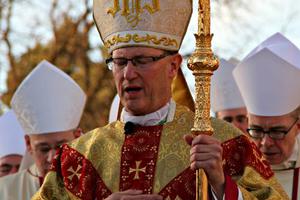On the Protection of Children and Young People
COMMENTARY

The Catholic Church is a supernatural community, united together in Christ Jesus, protected and sustained by the Holy Spirit. But the Church is also a community of human beings, of ordinary people, who are capable of great love and of great sinfulness.
Sin — especially the most grave sins — can have profoundly hurtful consequences for other people and for the community of the Church. The laws and policies of the Church help to ensure safety and freedom, particularly for children and for those most vulnerable to being harmed.
Since they were passed in 2002 by the Catholic bishops of the United States and approved by the Holy See, the Diocese of Lincoln has followed a set of Church laws called the “Essential Norms for Diocesan/Eparchial Policies Dealing With Allegations of Sexual Abuse of Minors by Priests or Deacons.” These norms are concerned with ensuring that child abuse has no place in the Church — that there is no room for it to take place and that it is not tolerated, under any circumstances, if it does take place. The Lincoln Diocese has also participated in most of the recommendations of the voluntary Charter for the Protection of Children and Young People, which is published by the U.S. Conference of Catholic Bishops (USCCB) as a guide for bishops to help maintain safe environments in the Church. Additionally, the Diocese of Lincoln observes every civil law regarding child-abuse protection and reporting.
Among the recommendations of the USCCB’s charter is that every diocese be audited each year to ensure that it has done all it can to help create safe environments. The purpose of the audit is accountability. It is not intended to be punitive or invasive, but instead to help dioceses create safe environments. The Diocese of Lincoln voluntarily participated in the audit when it first began in 2003. At that time, the process was still being worked out, and it needed refinements. Legitimate questions were raised about its purpose and methodology. For that reason, the Diocese of Lincoln elected not to participate in subsequent audits. I believe that was a prudent decision.
Since 2003, the audit process has improved. It now offers some clear benefit to dioceses that undergo it, with minimal interference in the ministry of the Church. It helps bishops hold themselves accountable, and it offers the virtue of transparency — an assurance that the Church takes child protection seriously. It also offers “best practices” to help every diocese be vigilant about safety for children. For that reason, in consultation with priests of the diocese, I have decided to participate in the audit in 2016. After that time, I will consult with our priests and local lay experts again, in order to determine whether or not we should continue.
The audit is a voluntary process. It involves review of diocesan policies and review of the extent to which we follow our policies. It does not involve review of our priests’ personal information or of the personal and private information of diocesan employees or parishioners. It is designed to be a tool. I believe it will demonstrate clearly that the Diocese of Lincoln does an excellent job creating and maintaining safe environments for children.
Of course, the USCCB’s audit is mostly an evaluative device. It measures what we are already doing. And it is not the most important tool for creating and maintaining safe environments. The most important tool is our integrity — our commitment to do good and to avoid evil. Holiness, in each one of us, is the best way to keep our children safe. We are blessed with holy priests, holy religious, holy teachers, holy volunteers and holy parents — you model holiness for our children, and in the Spirit of Christ, you protect them. Nothing is more important that that.
In the weeks and months to come, parents and parish volunteers will hear more about the audit and its process. But it is not a significant burden, and I suspect most people will think about it very little. That’s good. If we want to keep children safe, we should spend our time thinking most about Jesus Christ — and about the graced and blessed community he has given us in his holy Church.
Bishop James Conley heads the Diocese of Lincoln, Nebraska.
This commentary was reprinted with permission from the Southern Nebraska Register.
- Keywords:
- audit
- bishop james conley
- charter for the protection of children and young people
- diocese of lincoln
- nebraska

















